What Is a VPN and How It Works?
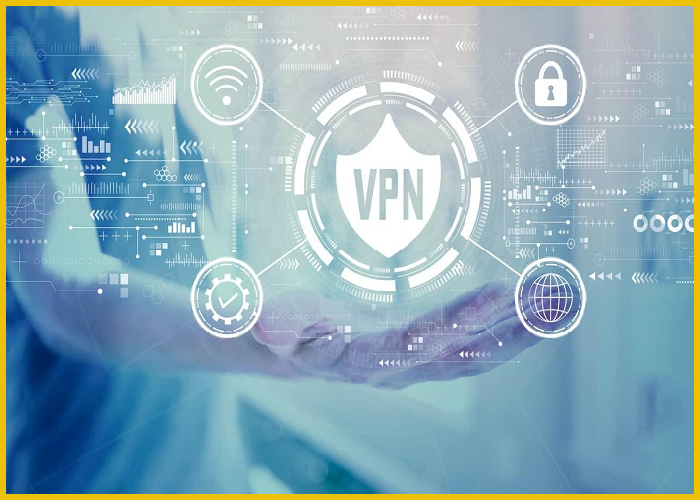
In an increasingly interconnected world where online privacy and security are paramount concerns, Virtual Private Networks (VPNs) have emerged as essential tools. A VPN creates a secure, encrypted connection between your device and the internet, masking your IP address and routing your online activities through a private server. This not only safeguards your data from prying eyes but also allows you to browse the web anonymously and access geo-restricted content.
VPNs are utilized by individuals, businesses, and organizations worldwide to protect sensitive information, bypass censorship, and maintain anonymity online. Understanding how VPNs work and their benefits can empower you to make informed decisions about your digital privacy and security. This article delves into the fundamentals of VPN technology, explaining its mechanics, encryption methods, and practical applications in today’s digital landscape.
What is a Virtual Private Network (VPN)?
In today’s digital age, where privacy and security concerns are paramount, Virtual Private Networks (VPNs) play a crucial role in safeguarding online activities and sensitive information. A VPN creates a secure connection between a user’s device and a private network, encrypting the data that passes through it. This ensures that the user’s online activities remain private and protected from prying eyes.
How Does a VPN Work?
At its core, a VPN operates by creating a secure tunnel between the user’s device and a VPN server. Here’s how it works step-by-step:
Encryption: When a user connects to a VPN, all data transmitted between their device and the VPN server is encrypted. This encryption scrambles the data in such a way that only authorized parties with the decryption key can access and understand it.
Secure Connection: The encrypted data travels through a secure tunnel created by the VPN, preventing hackers, ISPs (Internet Service Providers), and other third parties from intercepting or tampering with it.
IP Address Masking: VPNs mask the user’s IP address by assigning them an IP address from the VPN server’s pool. This hides their true location and identity, making it difficult for websites, advertisers, and malicious actors to track their online activities.
Location Spoofing: By connecting to VPN servers located in different countries, users can spoof their geographical location. This allows them to bypass geo-restrictions imposed by streaming services, websites, or governments.
Benefits of Using a VPN:
Enhanced Security: VPNs encrypt data to protect it from cyber threats, such as hacking and data interception, especially on unsecured public Wi-Fi networks.
Privacy Protection: VPNs provide anonymity by masking IP addresses and preventing online tracking by ISPs, advertisers, and websites.
Access to Restricted Content: Users can access geo-blocked content and services by connecting to VPN servers in different regions.
Remote Access: VPNs enable secure remote access to corporate networks and resources for employees working from home or traveling.
Common Uses of VPN:
Personal Privacy: Individuals use VPNs to browse the internet anonymously, protect sensitive data, and access content restricted in their region.
Business Security: Companies utilize VPNs to secure remote access for employees, connect branch offices securely, and protect confidential information.
Circumventing Censorship: VPNs are used by journalists, activists, and citizens in censored countries to bypass government restrictions and access uncensored information.
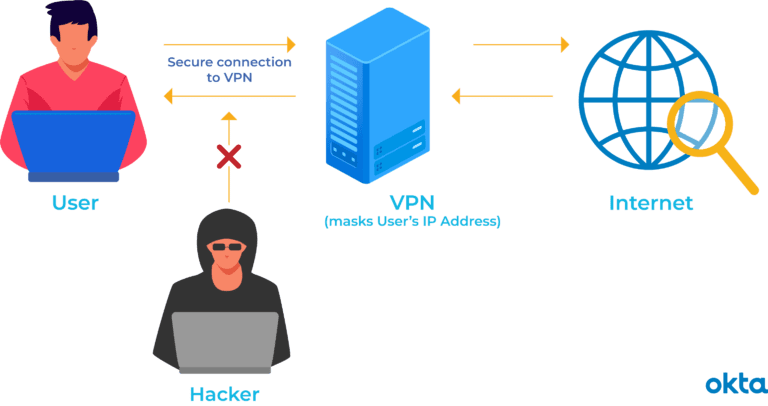
Using a Virtual Private Network (VPN) is straightforward once you have selected a VPN service and set it up on your device. Here’s a step-by-step guide on how to use a VPN:
1. Choose a VPN Service
Choosing a VPN service involves evaluating several key factors to ensure it meets your privacy, security, and performance needs. Start by considering the VPN’s encryption standards and privacy policy to ensure your data is secure and not logged or sold. Look for a VPN with a strong reputation and positive reviews, as well as a robust server network that offers good speed and reliability.
It’s also important to check for features such as a kill switch, which disconnects you from the internet if the VPN connection drops, and support for multiple devices. Compare pricing plans and free trial options to find a service that fits your budget and allows you to test its performance before committing.
2. Sign Up and Install the VPN Software
Sign Up: Create an account on the VPN provider’s website and subscribe to a suitable plan.
Download and Install: Download the VPN software/app from the provider’s website or app store. Install the software on your device (computer, smartphone, tablet).
3. Configure VPN Settings
Launch the App: Open the VPN app/software on your device.
Log In: Use the credentials (username and password) you created during sign-up to log into the VPN app.
4. Connect to a VPN Server
Choose a Server: Most VPN apps/software will display a list of server locations. Choose a server location from where you want to browse the internet.
Connect: Click or tap on the “Connect” button next to your chosen server location. The VPN app will establish a secure connection to the selected server.
5. Verify Connection
Verifying your VPN connection is crucial to ensure that your data is being securely routed and your privacy is protected. After connecting to a VPN, start by checking your IP address to confirm that it reflects the VPN server’s location rather than your actual geographical location. You can use websites like WhatIsMyIP.com or IPLeak.net for this verification.
Additionally, perform a DNS leak test to ensure that your DNS queries are being routed through the VPN and not exposed to your ISP or other entities. Make sure that no IP or DNS leaks are detected, which could compromise your anonymity.
Finally, assess the VPN’s performance by browsing the internet and checking for any speed reductions or connectivity issues, and ensure that the VPN’s kill switch feature is active to prevent any accidental exposure of your real IP address if the VPN connection drops. Regular verification helps maintain the integrity of your secure connection and protects your personal data.
6. Use the Internet Securely
Using the internet securely involves adopting several best practices to protect your personal information and maintain privacy. Start by using strong, unique passwords for different accounts and consider a password manager to keep track of them. Enable two-factor authentication (2FA) wherever possible to add an extra layer of security. Be cautious of phishing attempts by avoiding suspicious emails, links, and attachments. Ensure your connections are encrypted by using HTTPS sites and a reputable VPN service to mask your IP address and encrypt your online activity.
7. Disconnect from VPN
Disconnecting from a VPN is a straightforward process but essential for ensuring that your network activity is no longer routed through the VPN server. To disconnect, open your VPN application and look for the “Disconnect” or “Disconnect VPN” button, usually located on the main dashboard. Click this button to terminate the VPN connection. Once disconnected, verify that your IP address and DNS settings have reverted to their original state by using IP lookup and DNS leak test tools. This ensures that your real IP address is visible and that no residual data is being routed through the VPN. After disconnecting, monitor your connection to ensure there are no unexpected drops or issues
Tips for Using a VPN:
Automatic Connection: Some VPN apps/software offer an option to automatically connect whenever you access the internet, ensuring constant protection.
Server Selection: Depending on your needs (e.g., accessing region-restricted content), you may need to switch server locations within the VPN app/software.
Kill Switch: Enable the VPN provider’s “Kill Switch” feature if available. This automatically disconnects your internet if the VPN connection drops, preventing data leaks.
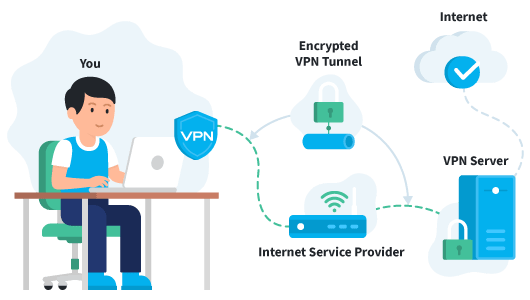
Choose Your VPN
Selecting the best VPN depends on your specific needs, including security features, speed, server locations, and pricing. Here are some widely recognized VPN providers known for their reliability and performance:
1. ExpressVPN
ExpressVPN is a highly acclaimed VPN service distinguished by its exceptional speed, security, and user-friendly experience. It utilizes advanced encryption protocols, including AES-256, to safeguard your data and maintain your privacy.
Boasting a vast network of servers across 94 countries, ExpressVPN offers reliable access to geo-restricted content and ensures a seamless browsing experience. The service features intuitive apps compatible with various platforms, including Windows, macOS, iOS, Android, and Linux, as well as browser extensions for Chrome and Firefox, making it accessible and convenient for all your devices.
2. NordVPN
NordVPN is a popular VPN service known for its strong security features, extensive server network, and user-friendly interface. It offers robust encryption using AES-256, along with a range of privacy features including a strict no-logs policy, a kill switch, and DNS leak protection.
NordVPN provides access to over 5,500 servers in 60 countries, allowing users to bypass geo-restrictions and access content from around the world. It also supports features like Double VPN for added security and CyberSec for ad and malware blocking. With apps available for various platforms, including Windows, macOS, iOS, Android, and Linux, NordVPN ensures that users can secure their internet connections across multiple devices.
Its performance is generally strong, with minimal impact on internet speeds, making it a solid choice for privacy-conscious users and those looking to access global content.
3. Surfshark
Surfshark is a versatile VPN service known for its affordability and extensive feature set. It provides strong security with AES-256 encryption, a no-logs policy, and additional features like a kill switch and DNS leak protection. Surfshark stands out with its unlimited device policy, allowing users to connect and protect as many devices as they want with a single subscription.
With over 3,200 servers across 100 countries, Surfshark offers reliable access to global content and helps users bypass geo-restrictions. Its CleanWeb feature blocks ads, trackers, and malware, enhancing your browsing experience. Surfshark also includes features like MultiHop, which routes your connection through multiple servers for extra security, and Whitelister, allowing certain apps or websites to bypass the VPN. Its apps are available for various platforms, including Windows, macOS, iOS, Android, and Linux.
Surfshark’s combination of features, performance, and competitive pricing makes it an appealing choice for users looking for a comprehensive and cost-effective VPN solution.
4. CyberGhost
CyberGhost is a well-regarded VPN service known for its user-friendly interface, robust security features, and extensive server network. It offers strong encryption using AES-256, along with a no-logs policy to ensure your online activities remain private. With over 7,000 servers in 90 countries, CyberGhost provides reliable access to geo-restricted content and helps you bypass regional blocks with ease.
The VPN service features a user-friendly app that’s available for a wide range of devices, including Windows, macOS, iOS, Android, and Linux, as well as browser extensions for Chrome and Firefox. CyberGhost includes several useful features such as an ad blocker, a kill switch, and DNS and IP leak protection. Its streaming-optimized servers are tailored for accessing popular streaming platforms, while the dedicated servers for torrenting ensure a seamless experience for file sharing.
5. IPVanish
IPVanish is a popular VPN service known for its strong security features, high performance, and extensive server network. It provides robust encryption with AES-256, a no-logs policy to protect user privacy, and includes features like a kill switch and DNS leak protection. IPVanish operates over 2,000 servers in more than 75 locations, offering reliable access to global content and the ability to bypass regional restrictions.
One of IPVanish’s standout features is its commitment to user privacy, with no logging of connection or usage data. The service supports an unlimited number of simultaneous connections, allowing users to secure all their devices under a single subscription. IPVanish’s apps are available for a range of platforms, including Windows, macOS, iOS, Android, and Linux, ensuring broad compatibility.
6. Private Internet Access (PIA)
Private Internet Access (PIA) is a well-regarded VPN service known for its strong privacy protections, customizable features, and extensive server network. It offers robust encryption with AES-256, a strict no-logs policy to ensure user activity is not tracked, and advanced security features like a kill switch and DNS leak protection. With over 35,000 servers in 84 countries, PIA provides a wide range of options for bypassing geo-restrictions and accessing global content.
PIA is notable for its flexibility and customization options, allowing users to configure encryption settings, VPN protocols, and other features according to their needs. Its apps are compatible with various platforms, including Windows, macOS, iOS, Android, and Linux, and it also offers browser extensions for Chrome and Firefox. The service supports up to 10 simultaneous connections per account, making it a good choice for households with multiple users or devices.
In addition to its strong security and privacy features, PIA is known for its affordability and value, often offering competitive pricing and discounts. Overall, Private Internet Access is a solid choice for users seeking a reliable and customizable VPN solution with a focus on privacy and extensive server coverage.
Virtual Private Network (VPN) can significantly enhance your online security and privacy in several ways:
Encryption of Data
A VPN encrypts all data transmitted between your device and the VPN server. This encryption ensures that even if someone intercepts your internet traffic, they cannot decipher it without the encryption key. This is particularly crucial when using public Wi-Fi networks, where your data could be vulnerable to hackers.
Masking IP Address
When you connect to a VPN server, your real IP address is replaced with the VPN server’s IP address. This masks your true location and identity, making it difficult for websites, advertisers, and other third parties to track your online activities.
Preventing Tracking and Logging
Reputable VPN services adhere to strict no-logs policies, meaning they do not track or store your browsing history, connection timestamps, or session duration. This ensures that your online activities remain private and cannot be traced back to you.
Bypassing Geo-restrictions
VPNs allow you to access websites, services, and content that may be restricted based on your geographical location. By connecting to VPN servers in different countries, you can circumvent geo-blocks and access a wider range of online resources.
Enhancing Privacy on Public Networks
Public Wi-Fi networks, such as those in coffee shops, airports, and hotels, are often insecure. Using a VPN encrypts your internet traffic, protecting sensitive information (like passwords and financial details) from being intercepted by malicious actors.
Limitations and Considerations
While VPNs provide robust security measures, it’s essential to be aware of their limitations:
Trustworthy VPN Provider: Choose a reputable VPN provider that offers strong encryption protocols and has a transparent privacy policy.
Legal Considerations: VPNs can anonymize your online activities, but illegal activities conducted through a VPN can still be traced back to you through other means, such as payment records or user behavior patterns.
Internet Speed: VPNs may reduce your internet speed due to the encryption process and the distance to the VPN server. However, reputable VPN services strive to minimize this impact.
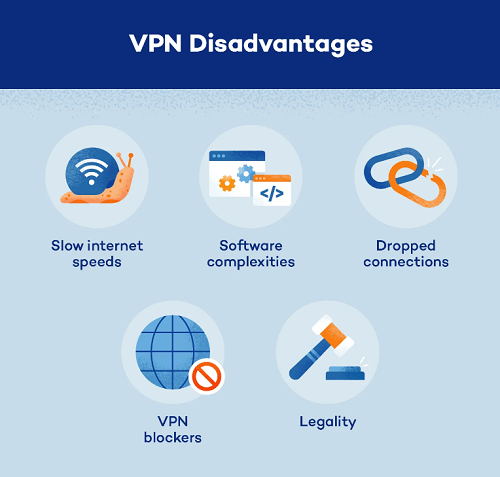
A VPN is a valuable tool for enhancing online privacy and security by encrypting your internet traffic and masking your IP address. It provides effective protection against potential threats on public Wi-Fi networks and allows for secure access to geo-blocked content.
However, choosing a reputable VPN provider and understanding its limitations are crucial steps in leveraging its benefits effectively. VPNs complement other cybersecurity measures and should be used in conjunction with good online practices to ensure comprehensive protection online.


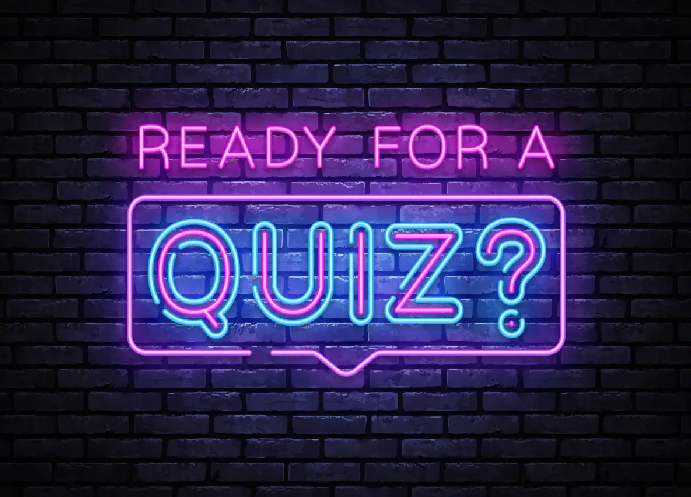
Post Comment